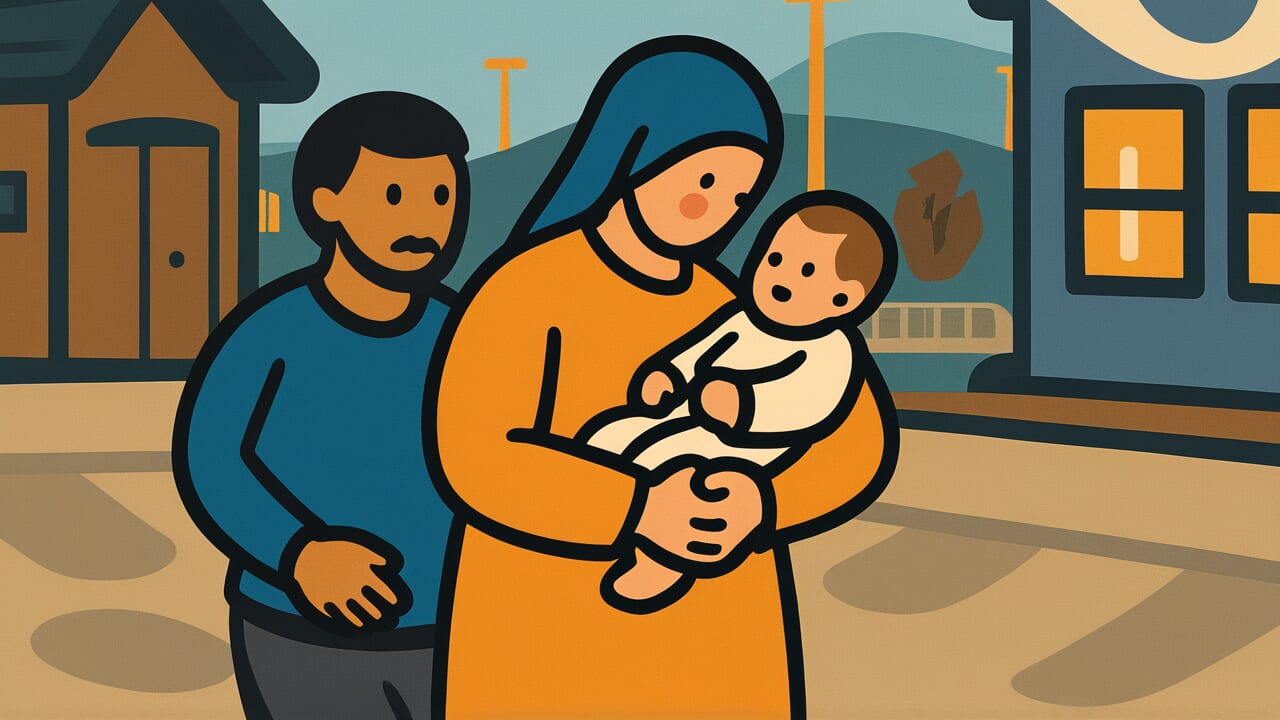How to Read “A childless person lives in the belly of someone with children”
Komochi no hara ni yadonashi ga iru
Meaning of “A childless person lives in the belly of someone with children”
This proverb means that staying as a guest in a household with children is uncomfortable. It teaches that people should understand their position.
Families raising children already carry many burdens. They must care for their kids, handle education, and manage living expenses. When an outsider stays with them, the family’s burden grows even heavier.
The guest also feels awkward in this situation.
This proverb is mainly used when someone staying at another’s house needs to remember their position. They should show consideration and restraint.
It also serves as advice for people planning to stay at someone else’s home.
In households with children, family life revolves around the kids. The guest must be extra careful and thoughtful.
Even today, this teaching applies when staying long-term with relatives or friends.
Origin and Etymology
The exact first written appearance of this proverb is unclear. However, its structure suggests it emerged from common life during the Edo period.
“Komochi” means a household with children. “Yadonashi” means a person without a home, essentially a houseguest.
In Edo period Japan, relatives or acquaintances often stayed at others’ homes. This could be temporary or long-term. Such arrangements were not unusual.
However, households with children faced large expenses for food and daily life. Taking in a guest added significant economic and mental strain.
The word “hara” (belly) is particularly interesting. It doesn’t simply mean house or household. It subtly suggests a mother’s pregnant state, nurturing new life inside her.
This expression vividly captures the difficulty of the situation. A family is already devoted to the fundamental task of bearing and raising children. Having an outsider stay there makes everything harder.
This proverb likely served as a warning to houseguests. It reminded them how difficult child-rearing is. It taught them how much consideration they should show.
The saying expressed an unspoken social understanding of that time.
Usage Examples
- I’m staying at my friend’s place, but “a childless person lives in the belly of someone with children,” so I should find my own place soon
- I thought about moving back to my parents’ house, but my brother’s wife just had a baby, and “a childless person lives in the belly of someone with children,” so I’ll hold off
Universal Wisdom
This proverb has been passed down because it addresses an eternal theme in human society: dependence versus independence.
Everyone sometimes needs help from others. But we must also recognize that those who help us have limits.
Raising children is humanity’s most fundamental and important work. It involves nurturing the next generation. Parents pour all their time, energy, and economic resources into this task.
People who don’t understand this situation and only prioritize their own convenience end up destroying relationships.
This proverb teaches more than just restraint or consideration. It teaches “the power to imagine the weight of others’ lives.”
What situation is the other person in right now? What must they prioritize? Understanding this and viewing your own position objectively requires humility.
This wisdom makes human relationships work smoothly.
The proverb also teaches those who help others. Families with children don’t need to force themselves to accept outsiders. Protecting your own family comes first.
This is not cold-hearted. Our ancestors knew the importance of setting boundaries.
When AI Hears This
In physics, any system with energy must have “usable surplus.” For example, water boils at 100 degrees because water molecules have surplus energy.
But when we view a child-rearing household as a thermodynamic system, an interesting contradiction appears.
Parents raising children use their time, money, and mental capacity almost to the limit. In physics terms, this is “a state where free energy approaches zero.”
In this state, adding new elements should collapse the entire system. Just as adding water to a pot of boiling water lowers the temperature, adding a new person to a household without margin disrupts the balance.
Yet in human society, the opposite happens. Statistical research shows that households with children are more likely to help people in need.
This contradicts the physical law that “entropy increases (disorder spreads).” This is a one-way process in physics.
Humans possess “priority redistribution through empathy.” Even when physical surplus is zero, people can psychologically reorganize importance. They create margin that shouldn’t exist.
This proverb points out, with irony, this “power to exceed energy conservation laws” that humans possess. A uniquely human phenomenon that physics cannot explain is condensed here.
Lessons for Today
This proverb teaches modern people the importance of “objectively viewing your own position.”
Sometimes we focus only on our own convenience and circumstances. We rely too much on others’ kindness without fully understanding their situation.
In modern society especially, nuclear families are the norm. The burden on child-rearing households is greater than ever.
Only two parents raise children, work jobs, and handle housework. We must imagine the weight of staying long in such a home.
This doesn’t mean you shouldn’t ask for help when in trouble. Rather, when receiving help, don’t forget to consider the other person.
Make efforts to become independent as soon as possible. Hold gratitude in your heart. Act to lighten the other person’s burden even a little.
This attitude keeps relationships healthy.
When you’re in the position of helping others, not overextending yourself is also important. Protecting your own family is the top priority.
This is not selfish. By setting healthy boundaries, both you and those around you can be happier.



Comments